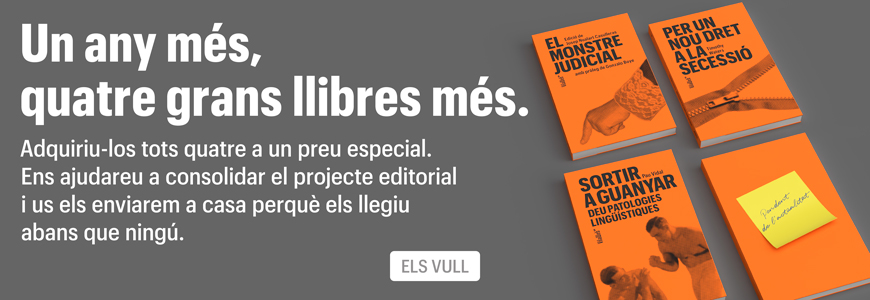07.04.2020 - 07:54
|
Actualització: 07.04.2020 - 09:54
Carles Muntaner was born in Barcelona, where he studied medicine, becoming a lecturer at the Autonomous University of Barcelona (UAB) in Psychiatry, Pharmacology, and Medical Psychology. At the age of 28 he went to the United States, spending ten years in the Department of Psychiatry and Medical Pharmacology of the National Institute of Health in Maryland. He studied Public Health at Johns Hopkins University and lectured at the University of Maryland. Then, about a decade ago, he moved to Canada, where he is currently Professor of Public Health, Nursing, and Psychiatry at the University of Toronto.
He is co-authored the article ‘The resilience of the Spanish health system against the COVID-19 pandemic‘ which appeared in The Lancet, the go-to journal for public health issues in the West, on 18 March. He spoke to VilaWeb from his home in Toronto, where he is currently in confinement. Muntaner, an independentist, is very critical of the management of the Covid-19 crisis in Catalonia.
– You recently wrote an article about the weaknesses of the Spanish and Catalan health systems. What are they?
– We’re seriously unprepared for epidemiological emergencies. For example, in Catalonia we have no experts or fundamental roles in this field in the public health system. It’s a core problem of structure and capacity to respond. We have no school in the field, which is a direct legacy of the Franco regime. Instead of training people in public health, we train elite researchers in epidemiology. That’s why we have many epidemiologists, but we don’t have public health specialists or emergency experts. As is now obvious, a universal public health system is now needed, which means having respirators and beds ready, protecting health workers and isolating the healthy from the sick. All of this is essential, and it’s the responsibility of the Public Health system. Until very recently, as far as I know, patients suffering from Covid-19 and those with other complaints were entering hospitals through the same door.
– So we only have epidemiologists then?
– Thank goodness for Oriol Mitjà, yes. A good epidemiologist who’d be prepared for an emergency. But look at Oriol Mitjà: he was at the Trias Foundation, not in a Catalan Government role, where there should be quite a few specialists of this sort. Now, they have taken on good researchers, such as the first-class Arena, from Rovira i Virgili University, where we have perhaps the best in Catalan research, such as Roger Guimerà. Or Antoni Plasència, head of Public Health of Barcelona during the governments of the leftist coalition and Artur Mas. He has also said good things on television. There are good, very good people. But these are isolated cases and we are not structurally prepared for a pandemic. And not everyone has done a good job. Joan Guix, Director of Public Health, is not Oriol Mitjà. Or Trilla, for example, who said in mid-March that we had virtually nothing to worry about. Or Joan Ramon Laporte, who said on TV that he wasn’t worried about Covid-19. We need a clear vision odf all this to be able to anticipate it all to be ready the next wave, in the autumn, or the next pandemic.
– During pandemics, effective communication with the population is crucial. How do you rate the Catalan Government’s performance?
– Well, it’s clear that we lack health communication experts. How the danger of contagion is communicated to the population is key. For example, the Commissioner of Barcelona’s Public Health Agency, Gemma Tarafa, appeared on behalf of Barcelona Mayor, Ada Colau, saying that people should help each other, but she is a biologist with no knowledge of Public Health. What a mess. She comes out and says something ambiguous that seems to encourage contact. Our political leaders were unprepared because they lacked the support of a group of experts.
– What’s your opinion of Health Minister Vergés and President Torra?
– I met them in mid-March as a matter of fact. They were well-intentioned, but they aren’t experts and they were afraid, and in these situations it is paramount to appear every day and communicate transparently. Don’t hide things. Hide nothing. You must be brave. We need them to go out and inform every day, and let people know you care about them like you care about your relatives. In situations like these, pro-independence leaders, and I have been an independentist for many years, have to communicate with the entire population of Catalonia. Let people see that their leaders are on their side, communicating their ideas clearly to everyone. During this crisis, communication has been another monumental flaw. There is still time to rectify this, though.
– The Catalan Ministry of Health is not publishing the number of deaths by county.
– I think it is terrible. Terrible. The Health Ministry not reporting the number of deaths by county is a lack of transparency. They have to answer to the people. They must inform them daily of the death toll in every county at the very least.
– When you met Torra and Vergés in mid-March, what did you say to them?
– That we had to copy the Chinese. People thought I was crazy. At that time, they had nobody with special training around them. And this is a very vulnerable situation for a politician. Very.
– Let’s move on to the Spanish state.
– They’ve made some serious mistakes. They started late and haven’t learned from the experience of China, Korea, Taiwan and Italy. In Madrid, it’s like here. There’s no culture of Public Health. They still think it’s the business of doctors. Their response was the authoritarian response of the “Franco regime that never went away”, as Lluc Salellas calls it. Torra was quite right to say that Catalonia should be sealed off, and the Spanish Government made the grave mistake of not doing so. They didn’t even seal off Madrid, and we’ve seen the consequences. The neoliberal measures that allow people to carry on going to work are a fiasco. They tried to protect the economy until the very last minute. They should have done something. Find another way out, instead of letting the epidemic spread so much. Culturally speaking, it’s clear that unregulated neoliberal capitalism can’t deal with epidemics due to its short-termism. Capitalism can’t even guarantee the most basic of functions: keeping people safe and free from illness. For example, if we wait for the private pharmaceutical industry to develop vaccines, we might wait forever. These companies aren’t steered by the public need.
– Playing devil’s advocate now: you live in a capitalist country, Canada, and Canada is not doing that badly. It is still a capitalist country.
– Canada is an exception. We have a unique health system. It’s completely public. In Canada, private medicine is illegal. In healthcare, it’s like Cuba. Or almost: medicines are not public and this is a serious shortcoming. The first day I arrived, I asked the professor, “Is there private psychiatry?” “It’s illegal”, I was told. Fantastic, I’ve arrived in the kind of country where I want to live. What’s more, in Canada they were very scared of SARS and they have very solid previous experience. They have prepared well for this crisis, though not as well as in Taiwan. We now have about 60 cases. The good thing here is that people have responded to the mere warning of an epidemic by confining themselves to their homes and, with the arrival of good weather, the measures have now been tightened. I’ve been quarantined for a fortnight, after spending three months in Barcelona. In my case, if I go out on the street, I’ll be fined half a million dollars. However, I’m not sure we won’t end up having a problem in Canada. We’ll see how it turns out.
– Do you want to add anything?
– I’d like to call for the resignation of Joan Guix, Secretary of Public Health of Catalonia. In Catalonia, Public Health officials must be held accountable. Things haven’t gone well. In Barcelona, the Public Health Agency has a group of academic epidemiologists of worldwide renown in the field of… inequality. I mean, come on! Shouldn’t those I mentioned earlier be in public health roles? I’d also set up a School of Public Health to prepare us for future epidemics and pandemics. This means creating Catalan institutions with experts in epidemiological emergencies. Because there will be a second wave and we need to be prepared, now and in the future. And there’s one more thing I’d like to add. May I?
– Please do.
– I’d like to pay tribute to my aunt, Rosa Bonet, who has died alone of Covid-19 in a Barcelona care home. She died today, on the same day we’re doing this interview. And like so many people who are dying these days, she lived through the Franco regime, and now she’s gone, like this, alone. A tribute to her memory.
[This article from the Catalan version of VilaWeb was kindly translated by Milford Edge, corrected by Dave Evans and published in this blog].




